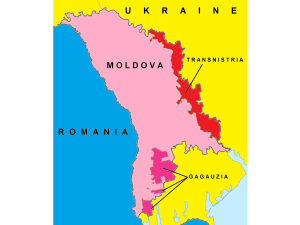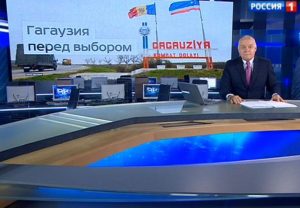And when all of those issues suddenly come together, as they have at various points since 1991, Moscow pulls out all the stops to use this nationality to promote its own interests. One of those times is now, and Moscow’s actions regarding this numerically small people are likely to have an impact not only on its traditional targets, Chisinau and Ankara, but on neighboring Kyiv as well.

The history of Moscow’s use of the Gagauz is long and complicated, ebbing and flowing depending on how the Kremlin has viewed what is going on inside Moldova and the impact of developments there on its interests (see EDM, July 26, 2013, November 11, 2014, March 31, 2015, June 5, 2018
, December 10, 2020). But it is about to become even more complex for three reasons.
- First, Moscow wants to counter the pro-Western president of Moldova, Maia Sandu, and derail her hopes to recover control over Transnistria (Nezavisimaya Gazeta, January 29, 2019).
- Second, it wants to discourage Kyiv from supporting her by signaling, as it has earlier, the way the Russian authorities might exploit Donbas in Ukraine as they are using the Gagauz in Moldova (DS News, July 14, 2016).
- Third, it seeks to counter Turkish influence on the Gagauz, given that Ankara has made clear that its vision of pan-Turkism is about a union of Turkic peoples and not just Turkic states (Ritm Eurasia, January 11, 2021; Novaya Gazeta, December 19, 2020).
The Turkish and Ukrainian dimensions of Moscow’s policy toward the Gagauz and the relations of that people with the Moldovan central government are almost certainly not as important in the Kremlin’s decision making as other factors. Rather, Moscow is convinced that the Gagauz, in combination with Transnistria, can effectively block Moldova from adopting more anti-Russian positions such as limiting the reach of Russian media or moving toward integration with the European Union or even the North Atlantic Treaty Organization (NATO). Consequently, Moscow’s renewed attention to the Gagauz is, first and foremost, about countering President Sandu and her pro-Western policies, Russian commentator Ilya Kiselyov says in an analysis published recently in the Ritm Eurasia portal (Ritm Eurasia, March 15).

Some in Moscow, the commentator says, dismiss Sandu as a threat because, in her first 100 days, she has not been able to form and obtain approval for a new government. But that is a mistake, Kiselyov argues. In fact, the Moldovan leader has taken many unilateral steps that alter the situation in Chisinau in ways that threaten Russia’s interests and make the position of the Gagauz potentially critical. The most important of these involve changes to the membership of the Moldovan Security Council.
, as the head of that autonomous region is known, was not included—an insult to the Gagauz and its leaders and one that suggests Chisinau under Sandu is prepared to ignore the pro-Russian feelings of this minority.
According to Kiselyov, this represents a sharp departure from Moldovan policy and even Sandu’s approach up to now.
After conflicts in the 1990s, the commentator recalls, Gagauzia acquired autonomous status, and the Moldovan Constitution proclaimed this entity’s right to elect its own head and National Assembly. That autonomy received and continues to receive significant support from Türkiye, which built schools and hospitals there, because the Gagauz are extremely close to Turks in almost all respects except for the fact that they are predominantly Orthodox Christians. That has sometimes worried politicians in Chisinau, as do the traditional pro-Moscow attitudes still widespread among the Gagauz, the commentator continues.
[boxright]
Gagauzia – object lesson for Ukraine on how a ‘reintegrated’ region gives Moscow leverage
[/boxright]
Because of these sentiments, the Gagauz have repeatedly voted for Moldovan presidential candidates they view as most pro-Russian and, therefore, most favorable to themselves.
In the last presidential election, the pro-Moscow incumbent, Igor Dodon, received 84.35 percent of Gagauz votes, while Sandu, perceived as pro-Western and anti-Russian, received only 2.05 percent.[/box]
Possibly because of that, Sandu has largely given up the pro-Gagauz positions she displayed before becoming president. And now, with her decision to drop Gagauzia from representation in the Moldovan Security Council, she seems set to move even further away from them. Kiselyov suggests Sandu may possibly adopt the language of Moldovan nationalists who favor union with Romania and who sometimes refer to the Russians in Transnistria as “occupiers” and the Gagauz as “separatists.”
Such comments, if they go unchecked, could become self-fulfilling prophecies, Kiselyov implies; and at a minimum, they mean Russia will have to work with both Transnistria and Gagauzia to restrain Sandu and keep Moldova in Moscow’s orbit (Ritm Eurasia, March 15).
Read more:
- Russian diplomats Chisinau expelled reportedly recruited Gagauz to fight in Ukraine (2017)
- Tatarstan’s efforts to help Gagauz de-Russify outrage some in Moscow (2016)
- Is Moldova’s apparent defeat Kremlin’s blueprint for Ukraine? (2016)
- Moscow overplayed its hand in Moldova and undermined Gagauz vote (2015)
- Moldova officials: Gagauz election and its pro-Moscow outcome may not be legitimate (2015)
- Moldova: Gagauz leaders “more Russian than Gagauz” (2014)
- Conflict conservation in Ukraine’s east follows the Transnistria model
- Bessarabia’s ‘ethnographic Harlequin’ in a regional perspective
- Stages of Russian occupation in a nutshell

